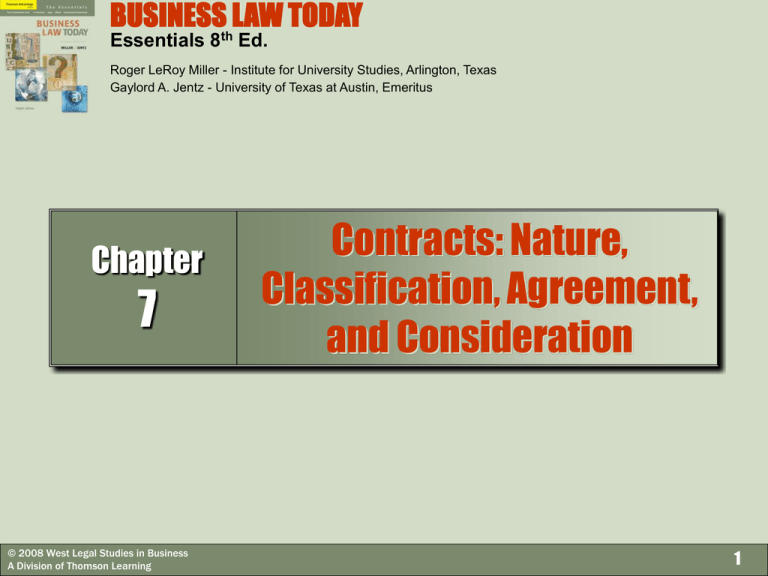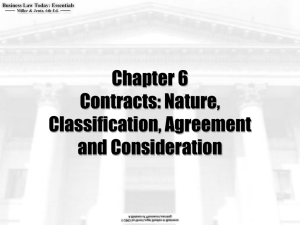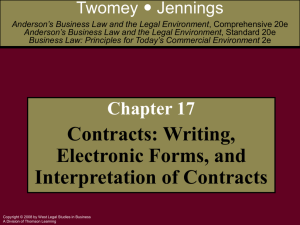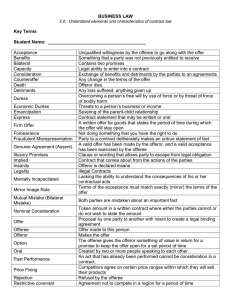What is a contract?
advertisement

BUSINESSthLAW TODAY Essentials 8 Ed. Roger LeRoy Miller - Institute for University Studies, Arlington, Texas Gaylord A. Jentz - University of Texas at Austin, Emeritus Chapter 7 © 2008 West Legal Studies in Business A Division of Thomson Learning Contracts: Nature, Classification, Agreement, and Consideration 1 Learning Objectives What is a contract? What are the four basic elements of a valid, enforceable contract? What are the various types of contracts? What are the requirements of an offer? How can an offer by accepted? What are the elements of consideration? © 2008 West Legal Studies in Business A Division of Thomson Learning 2 Contracts Function of Contracts: Fundamental to business. Creates rights and duties between parties. Provides stability and predictability. Parties: Promisor (makes the promise) and Promisee (accepts the promise). Definition of a Contract. Agreement that can be enforced in court. Formed by two or more parties. Failure to perform results in breach and damages. © 2008 West Legal Studies in Business A Division of Thomson Learning 3 Elements of a Contract A valid, enforceable contract includes: Agreement. Consideration. Capacity. Legality. Defenses to Enforceability: Genuineness of Assent. Form. © 2008 West Legal Studies in Business A Division of Thomson Learning 4 Contract Formation © 2008 West Legal Studies in Business A Division of Thomson Learning 5 Bilateral vs. Unilateral Contracts Bilateral Contracts: Offeror and Offeree exchange promises to each other. A contract is formed when Offeree promises to perform. © 2008 West Legal Studies in Business A Division of Thomson Learning 6 Bilateral vs. Unilateral Contracts Unilateral Contracts: Offeror wants performance in exchange for his promise. CASE 7.1 Ardito v. City of Providence (2003). Contract is formed when Offeree performs. Contests and lotteries are examples. Revocation of Offer: modern view is that offer is irrevocable once the Offeree substantially performs. © 2008 West Legal Studies in Business A Division of Thomson Learning 7 Formal vs. Informal Contracts Formal: require special form or method to be enforceable, e.g., under seal. Informal: all other contracts. © 2008 West Legal Studies in Business A Division of Thomson Learning 8 Express vs. Implied Contracts Express: terms of contract are set forth either in writing or orally. Implied-in-Fact: based on conduct. Plaintiff furnished service or product. Plaintiff expects to be compensated. Defendant had a chance to reject and did not. © 2008 West Legal Studies in Business A Division of Thomson Learning 9 Contract Performance Executed vs. Executory Contracts. Executed: fully performed by both sides. Executory: at least one of the parties has not performed. © 2008 West Legal Studies in Business A Division of Thomson Learning 10 Contract Enforceability Valid Contract. Four Elements: Agreement, Consideration, Legal Purposes, Parties have legal capacity. Voidable Contract. Valid contract that is legally defective and can be avoided (rescinded) by one of the parties. Void Contract. No contract at all. © 2008 West Legal Studies in Business A Division of Thomson Learning 11 Quasi Contracts Implied-in-Law Contracts (Quasi Contract). Fictional, created by court to avoid unjust enrichment. Limitations on quasi-contractual recovery. Cannot be used when an actual contract exists. © 2008 West Legal Studies in Business A Division of Thomson Learning 12 Requirements of the Offer An agreement consists of a valid offer and acceptance. An offer is the Offeror’s promise to perform. © 2008 West Legal Studies in Business A Division of Thomson Learning 13 Requirements of the Offer An offer requires serious, objection intention. CASE 7.2 Lucy v. Zehmer (1954). Opinions are not offers. Good Intentions are not offers. Preliminary Negotiations are not offers. Agreements to Agree are not offers. Reasonably definite terms. Communication to Offeree. © 2008 West Legal Studies in Business A Division of Thomson Learning 14 Termination of the Offer Termination of the Offer. By Act of the Parties. Revocation by the Offeror (unless irrevocable). Rejection by the Offeree (or counteroffer). Operation of Law: lapse of time, destruction, death or incompetence, supervening illegality. © 2008 West Legal Studies in Business A Division of Thomson Learning 15 Acceptance Voluntary act by Offeree that shows assent to terms of original offer. Mirror Image Rule. Offeree must unequivocally accept offer. Additional terms may be considered a counteroffer. Acceptance by Silence. Authorized Means of Communication is either express or implied by form of offer (e.g., U.S. mail, fax, email). © 2008 West Legal Studies in Business A Division of Thomson Learning 16 “Mailbox Rule” “Offeree accepts offer when the acceptance is dispatched to Offeror in the form it was received, unless offer requires a different method (e.g., Fed-Ex, or receipt by Offeror). Exceptions: Acceptance is not properly dispatched. Offer stipulates not accepted until received. Offeree rejects then accepts. First communication received determines whether contract is formed. © 2008 West Legal Studies in Business A Division of Thomson Learning 17 Consideration Consideration is value given in return for a promise. Elements: Something of legally sufficient value given in exchange for a promise and That is bargained for between the parties. © 2008 West Legal Studies in Business A Division of Thomson Learning 18 Contracts That Lack Consideration Pre-Existing Duty. Unforeseen Difficulties. Rescission and New Contract. Past Consideration. Illusory Promises. © 2008 West Legal Studies in Business A Division of Thomson Learning 19 Settlement of Claims Accord and Satisfaction. Release. CASE 7.3 BP Products North America, Inc. v. Oakridge at Winegard, Inc. (2007). Covenant Not to Sue. © 2008 West Legal Studies in Business A Division of Thomson Learning 20 Promissory Estoppel Promissory Estoppel (“detrimental reliance”) doctrine applies when a person relies on the promise of another to her legal detriment. Promisor is “estopped” (precluded) from revoking the promise. There must be: Clear and definite promise with substantial reliance. Justice is served by enforcement of the promise. © 2008 West Legal Studies in Business A Division of Thomson Learning 21






